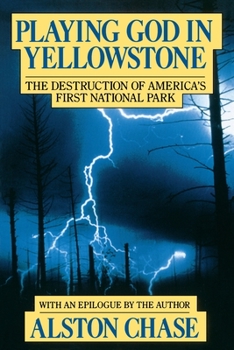Playing God in Yellowstone: The Destruction of American (Ameri)Ca's First National Park
Select Format
Select Condition 
Book Overview
Chase asserts that Yellowstone is being destroyed by the very people assigned to protect it: the National Park Service. Named as one of " ten books that mattered" in the 1980s by Outside magazine and... This description may be from another edition of this product.
Format:Paperback
Language:English
ISBN:0156720361
ISBN13:9780156720366
Release Date:December 1987
Publisher:Harper Paperbacks
Length:480 Pages
Weight:1.45 lbs.
Dimensions:1.3" x 5.8" x 9.0"
Customer Reviews
4 ratings
Fascinating history of our attempts to fix nature
Published by Thriftbooks.com User , 16 years ago
This is an epic tale of our evolving understanding of nature and whether and how we should mess with it. The book is not an indictment of environmentalism, as another reviewer suggests. If anything it endorses current environmental view of ecosystem and is an indictment of park service policies that were geared toward tourism instead of science. Chase thinks doing nothing with nature is equal folly--after all we've already done to alter the landscape. A wildlife biologist originally recommended this book to me so I could understand the field better.
Exposes the hypocrisy and politics of environmentalism
Published by Thriftbooks.com User , 16 years ago
"Playing God in Yellowstone" by Alston Chase is a scathing indictment of the National Park Service, detailing its many misguided attempts to preserve wildlife while making Yellowstone National Park a tourist hotspot. The federal agency's conflicted mission resulted in the park service's becoming the largest killer of animal life in the park, routinely exterminating wolves, bears, mountain lions, big horn sheep, and elk. The book also shows how politics trumped science routinely in deciding park policy. Decisions were made to preserve some animal species while eliminating others, without the benefit of any detailed biological studies of the park's ecosystem, which historically was not necessarily a natural habitat for many species found there at the beginning of the 20th century (farmers and cattlemen had cordoned off many grazing areas that antelope and other species had used for millenia). The park service favored elk, because they were popular with tourists, but the elk herds were enormously destructive in eating their way through all available food sources that other species needed to survive. What did the park service do when the elk herd grew too large? Shipped the animals to other parks, and arranged for mass slaughters to keep the herds in check. The park service also ignored the fact that Native Americans were not the nature-loving shepherds of the forest so often depicted in media portrayals. They employed forest fires as a means of driving game into areas where they could be hunted, and nearly exterminated many species before the white man arrived. (Although Chase does cite scientific studies that show the benefit of forest fires in helping to renew the environment for a wide variety of plant and animal species.) Meanwhile, such "watchdog" groups as the National Audobon Society, the Nature Conservancy, the Boone and Crockett Club, the Wilderness Society, and World Wildlife Fund were guided by former park service and Department of Interior officials, and tacitly endorsed policies that destroyed much of the natural environment. They, and the Sierra Club, encouraged people to visit the national parks, while conveniently ignoring the hugely destructive effects that hikers and campers wrought on forest areas. The endless God-like tinkering demonstrates a litany of unintended consequences. This book should be required reading for anyone who wants to understand the pitfalls of misguided environmental policies.
This is a book that makes you really think....what did we do?
Published by Thriftbooks.com User , 18 years ago
This is a wonderful book if you are a wildlife biologist or avid wildlife observer. The author does bash the Park Service quite severely, but in all honesty - look into the overall history of the Park Service - he isn't off by far. I truly enjoyed his personal point of view. If you are looking for just a history type book, this really isn't it. This is more of a personal account, more than it is strictly history based about the park service/yellowstone. Highly recommended for those of you with an open mind and a deep concern for our wildlife and national parks.
The uncomfortable truth
Published by Thriftbooks.com User , 21 years ago
I first learned of this book when I was working as a volunteer fire fighter in Northern California back in 1989. The subject came up one evening and the dinner table polarized between the Park Service/Forestry workers and the "environmentalist" crowd. (I was just helping out because my house was at risk from the fire and didn't fit into either camp.) The environmentalists hated the book while the professional forestry managers tried to explain to them that Chase had a lot of good points. I was curious enough to seek out the book to read and learned a lot. Chase's main point is that you can't have it both ways - if you don't want to manage these areas actively you are going to end up with the destruction of habitat and species you were trying to avoid - and proves his case in detail using the Yellowstone disaster as an example. His more recent book, In a Dark Wood, provides more evidence (including a depressing acount of how the unmanged elk herds in Yellowstone are destroying entire ecosystems...




